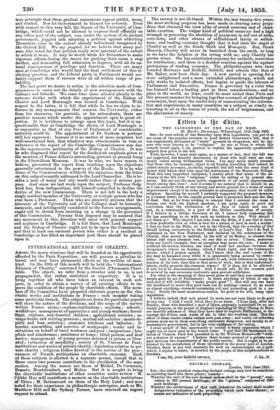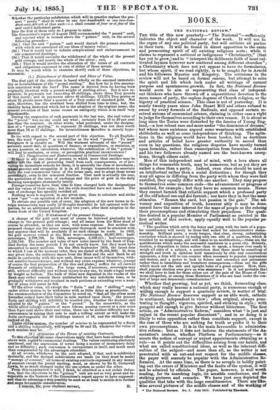DECIMAL COINAGE.
London, 181,4 An* 1855.
Sin—the entire question respecting decimal coinage may now be considered AS resolving itself into three points ; namely— Whether the unit of the new 'decimal system shall be the " pound," equi- valent to 960 present farthings; or the " guinea," composed of 1000 such farthings : Whether the subdivisions of that unit (whatever its value) shall receive designations indicative of the proportion which each bears thereto ; or names not indicative of-sueh-proportion Whetherthe-particular subdivision which will in practice replace the pre- sent " penny " shall in value be one two-hundredth or one two-hun- dred-and-fiftieth of that unit—i. e. shall consist of four or of five of the said unit's millesimal parts.
Into the first of these only do I propose to enter. The Committee's report of August 1853 recommended the " pound" unit, and rejected what is termed above the ". guinea" unit, on the several following grounds- - (1st.) 1 hat the said " guinea" unit would disturb the present standard, with which are associated all our ideas of money value; (2d.) That it would lead to infinite complications and embarrassment in our commercial dealings; (3d.)•That it would necessite the withdrawal of the whole of the present gold coinage, and nearly the whole of the silver ; and, (4th.) That it would involve the alteration of the terms of all contracts and obligations expreised in coin of either of these metals. It may be worth while to examine shortly each of these objections, in (1.) Ilisturbance of Standard and Ideas of Value. • The fired part Of the 'objection is based wholly on the assumed immutabi- lity or-invariableness of the " pound sterling.", But how far is this assump- tion consistent with the fact ? The name is derived from its having been originally identical with a pound-weight of sterling silver. But it now re- presents, in payments not exceeding 40 shillings, above three Troy pounds of that metal; and in payments above 40 shillings, 123,274 Troy grains or about grains more than a quarter of a Troy ounce of standard gold. Not only, therefore, has the standard been shifted from time to time, but, the identity being destroyed which led to the adoption of the original name, the present retention of that name causes an ambiguity which is in itself very elikotionable. During the suspension of cash payments in the last war, the real value of the " pound " was no one could say what ; certainly from 16 to 20 per cent less than the nominal. In other words, what professed, under the designa- tion of a "pound .sterling," to represent 20 shillings, was not then worth more than 16 or 17 shillings. Its invariableness therefore is merely hypo- thetical. • • So too with regard to the second part of this objection. To all English-
men -the word "guinea" is as familiar as the word " pound." To most foreigners it is equally so. Will the warmest advocate of the "pound" :seriously assert that, in questions of finance, or expenditure, or statistics, or in any,question or calculation whatever, the substitution. of the " guinea" will lead to collusion, or error, or perceptible practical inconvenience ?
(2.) Complication and Embarrassment in Commercial _Dealings. If-there is any one class of persona to which more than another may be
safely left the task of protecting itself from such consequences, or of pre- viding an immediate remedy for them, it is assuredly the class of merchants.; whose practice and occupation it is in all foreign transactions to ascertain daily the real commercial value of the terms used, and to adapt those terms accordingly, even to the minutest-fraction. That such is actually the case, the quotations of, the rates of exchange and the price of gold in the daily fawning newspapers abundantly testify. Foreign"countries have from time to time changed both the designations and the values of their coins ; but the evils described have not ensued. The rate of exchange has speedily. rectified all. Nothing. more is required, in any given case, than to calculate and strike a new "par "-en operation of a few seconds. To obviate any possible risk of error, the adoption of the new terms in fo- -reign transactions may easily. (if thought desirable) be left optional with the parties, for an additional period of say two years, after their adoption in the home trade of the 'United Kingdom.
• (8.) Withdrawal of the present Coinage. A change d the gold unit must of course be followed gradually by a change in the:genexal gold coinage ; and all issues from the Mint must of -course be attended, as they are now, with some expense: But neither the proposed change nor the issues consequent thereupon need be attended with any expense that will be avoidable if no such change -be made. In 1858, the gold moneys coined at the Mint were—sovereigns, 10,697,993;
Aievereigus,- 2,708,796. - In -1854, sovereigns, .3,589,611; half-sovereigns, 1,126,144. The number and value of new notes issued by the Bank of Eng- land during the same periods I do not exactly know, but they must have amounted to many millions.' On the 30th September 1854, the latest date to whiob I can at tbeMoment refer' they are stated at26,464,300/.• If, from any given date, the ordinary issues from the Mint and the said- Bank be aU made in conformity _with the new unit, these issues will of themselves, with- out sensibleinconvenience, and without any extra expense whatever,.(except of course the first preparation of the dies and plates,) suffice for all current -demands of ordinary trade. For large sums, if-necessary, sovereigns may -still, without difficulty and without injury to any one, be made aleal tender -by weight ae bullion. The bulk of those now deposited in the vau te of the Bank-may either remain there undisturbed for any indefinite time, or be gradually withdrawn and secoined in such portions as extending over a num- ber of years will never be felt.
Of the silver coins, all except the " florin " and the " shilling" ought
under either system to be withdrawn with as little delay as practicable. If the recommendation of the Committee be acted on, " that all the silver coins hereafter coined have their value in mils marked upon them," the present florin and shilling will infallibly be recalled also, whether the decimal unit adopted be the guinea " or the " pound." In the meanwhile, as the whole siliet-coinege consists of mere tokens, passing current at a rate more than fifer cent above their real value, there can be neither difficulty nor in- convenieuciin iiising that rate to such a trifling extent as will make- he florin exchangeable for 50 farthinga instead of 48, and the shilling for 25
instead.of . -
Under either. system, the number of minims to be represented by a florin and a shilling respectivelYj will equally be 50 and 25, whatever the value of such minima may be " -
teration of the Terms of existing Contracts.
tifeame observations apply that have been already offered itoeommereial dealings. The values continuing absolutely the conversion of terms being a matter of momentary delay and no difficulty ; such conversion is unimportant in itself, and much more than-compensated by the advantages attendant.
At all events, whichever be the unit adopted, if that unit is subdivided
decimally, and the decimal subdivisions are made (as they must be made) "moneys of account," all terms of existing contracts expressed in any money of account except the pound sterling, must, as shown by Sir a. Cornewall .Lewis, be as much changed under the one system as under the other.
From this examination it will, I think, be admitted as a not unfair deduc-
tion, that the objections to the "guinea" unit are not so very great and in- superable as the framers of the Committee's report appear to have supposed: -and that its advantages may possibly be such as at least to entilleitto further and more favourable consideration.
(4)
To this objeetf above with r unaltered, i
I remain, Sir, your obedient servant, R.



























 Previous page
Previous page